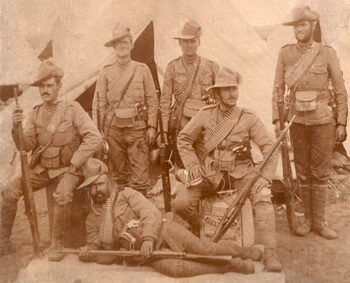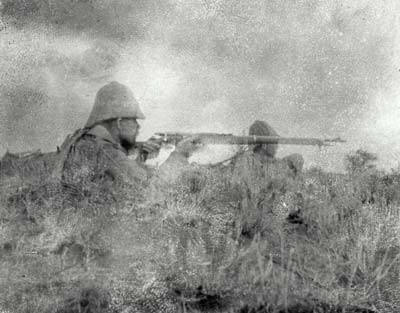
Canadians in South Africa. [Canadian War Museum]
The Afrikaans-speaking Boers, descended from Dutch settlers, were now British subjects, while the resource-rich lands belonged to the Crown.
Fuelled by imperialism, numerous atrocities had been committed during some three years of bloody battles, scorched earth policy and in concentration camps run by the British.
Yet, it was also the Dominion of Canada’s first overseas war.
Back in July 1899, Canadians had weighed the choice, as it was, of whether to intervene in the affairs of a faraway region that few would have considered consequential to daily life. Britain had hoped for a voluntary commitment to the Empire’s cause, but the ensuing debate promptly revealed deep divisions.
Anglophones largely supported the taking up of arms for their “mother country” in its perceived hour of need. For many French Canadians, however, the brewing conflict was of no interest; some even sympathized with the Boers’ plight to preserve cultural identity against the Crown’s encroachment.
With opinion broadly split down linguistic lines—albeit not devoid of nuances and complexities—Prime Minister Wilfrid Laurier attempted to steer clear of the conflict until a strident pro-war lobby movement took hold.
The prospect of mobilization was made somewhat simpler when the Boers, having delivered an ultimatum to imperial forces on the Transvaal borders, launched a direct assault into British territory on Oct. 11, 1899.

Canadian infantry engaging with Boers. [Canadian War Museum]
From Zand River to Mafeking, Diamond Hill to Lydenberg, Canadians showcased their ability many times over.
The Boer War was no longer just a threat, but a reality to the Empire, and Canada, despite Laurier’s misgivings, intended to respond.
From Oct. 30, 1899, when the first Canadian contingent departed Quebec City, until the war’s end on May 31, 1902, 7,368 Canadians—soldiers, constables, nursing sisters and more—served with distinction in South Africa.
The Dominion’s volunteers participated in several battles. Between Feb. 18 and 27, 1900, 2nd (Special Service) Battalion, Royal Canadian Regiment, helped secure Britain’s first major victory at Paardeberg. Several months later, in November, the Royal Canadian Dragoons, together with members of the Royal Canadian Field Artillery, played a critical role in facilitating a British withdrawal at Leliefontein. At Hart’s River in March 1902, Dominion troops of 2nd Regiment, Canadian Mounted Rifles displayed extraordinary valour against perilous odds.
From Zand River to Mafeking, Diamond Hill to Lydenberg, Canadians showcased their ability many times over. By the time the Treaty of Vereeniging was signed, four individuals had earned the Victoria Cross.
Despite this, Canada didn’t entirely escape culpability in the atrocities committed against locals. Particularly when the Boers later adopted guerilla-style warfare, farm burnings were carried out by Canadian troops to deny the enemy food supplies. This and other contentious tactics—including the mass internment of Boer women and children under horrendous conditions—left a difficult legacy for all victors, imperial or dominion.
Some 280 Canadians died, a high proportion of whom succumbed to disease rather than combat wounds.
Advertisement






















